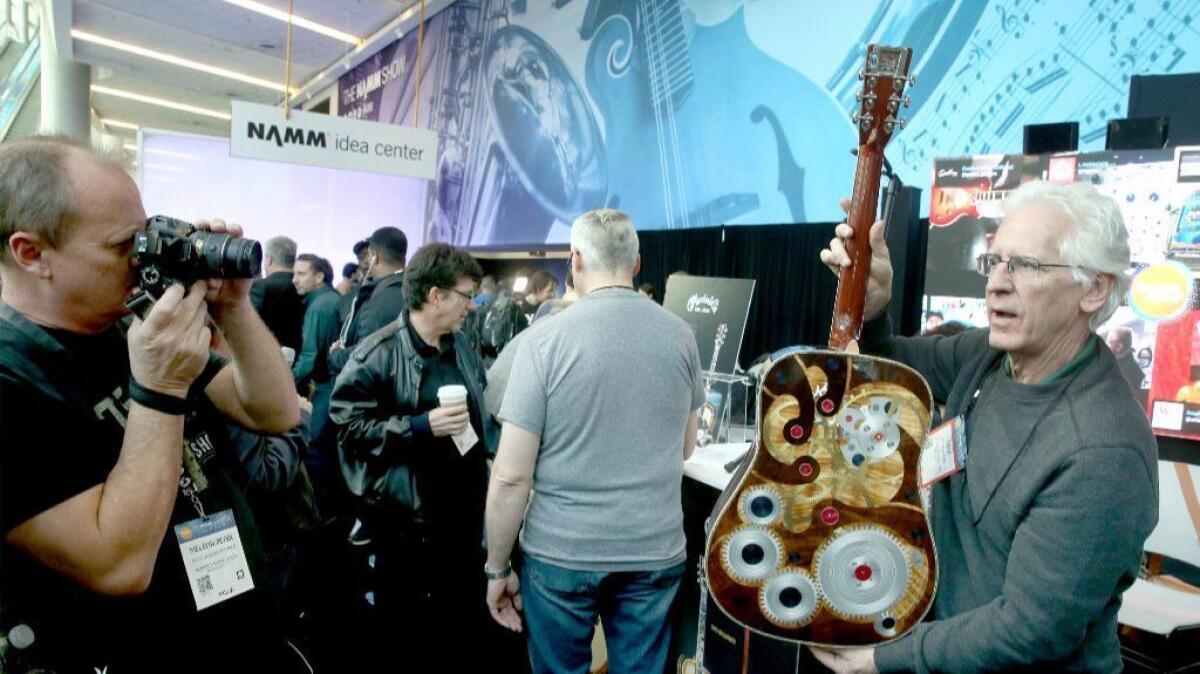NAMM Show spotlights the world of music

First-time attendees are often in a state of awe as they walk around the NAMM Show, the enormous annual trade show staged by the Carlsbad-based National Assn. of Music Merchants at the Anaheim Convention Center.
But awe is also common for veterans of the show. Its 116th edition, which runs Thursday through Sunday, is expected to draw a record 102,000 NAMM members from more than 125 countries and regions around the world.
“I first attended the show in 1988, and I was overwhelmed. It’s the closest thing to Fantasy Island for a musician you can imagine!” said Richard McDonald, executive vice president for Fender Musical Instruments Corp.
“I have the same response now. The NAMM Show is extraordinarily important, and it has grown over the years to really become the global show for our industry.”
The NAMM Show fills virtually every inch of the convention center’s 1.6 million square feet. Next year’s opening of the center’s new North Building will enable NAMM to expand by an additional 200,000 square feet.
There isn’t a wasted inch at the show, which this year features more than 6,000 brands produced by more than 1,700 companies from around the world.
Fender is unveiling its American Professional guitar line. It replaces the 30-year-old American Standard series from California-based Fender, which has operated a large factory in Ensenada since 1987.
Yamaha is showcasing 77 new instruments and products as well as staging private all-star concerts. Previous years’ line-ups have featured Elton John, Earth, Wind & Fire and Sarah McLachlan.
The show is also where GearSecure will introduce its new embedded anti-theft device for musical instruments. And it’s where Lemon Grove’s Deering Banjos will debut its John McEuen Signature model, a limited-edition instrument priced at $8,499.
“There’s a real duality,” said Joe Lamond, who has been NAMM’s chief executive since 2001.
“There’s the love of handcrafted acoustic instruments. And there’s an insatiable appetite for new products that plug into a wall. That’s the fastest growing area for us — music technology and event technology, such as live sound gear for theaters, which speaks to the obsolescence side of our industry, in which this year’s model is a lot better than last year’s,” he said.
Founded in 1901, the nonprofit NAMM represents 10,300 member companies from 104 countries and regions. The 1,700 companies whose wares will be displayed at the NAMM Show this week will offer a look at an industry whose reach extends to almost every corner of the Earth.
Sales of music instruments, technology and audio products brought in $7 billion in the United States in 2015, the same as 2014.
Worldwide sales rose to $17 billion in 2015, up from $16.6 billion in 2014. The figures for 2016 will be released by NAMM in April. Worldwide sales in 2008, tallied shortly before the recession kicked in, were $18 billion.
NAMM also produces a smaller summer show each July in Nashville.
Though the annual trade show in Anaheim is certainly the most visible annual event NAMM stages, the nonprofit organization is also known for its year-round work on behalf of music education and the benefits of music-making.
As part of its business model as a nonprofit, it channels its NAMM Show revenues back into promoting music, nurturing kids in music and lobbying to change laws to further music and arts education.
“Our simple mantra is to get more people to start playing music and fewer to quit,” Lamond said. “First and foremost is creating the case for music education, funding music-brain research at universities around the world, and then making decision-makers in government and parents aware that, beyond any reasonable doubt, kids who engage in music and art will do better in life.”
Lamond and some of his NAMM colleagues have for years been a regular presence on Capitol Hill. Their lobbying was credited with helping to win passage of the Every Student Succeeds Act of 2015. The legislation has provided more access to music and arts courses for public school children across the nation, as part of a well-rounded education.
“Ninety percent of the schools in this country now offer music and arts programs,” Lamond said. “That’s life-changing — and gets everyone at NAMM out of bed, every morning, and coming to work with a purpose.”
george.varga@sduniontribune.com
More to Read
Inside the business of entertainment
The Wide Shot brings you news, analysis and insights on everything from streaming wars to production — and what it all means for the future.
You may occasionally receive promotional content from the Los Angeles Times.










